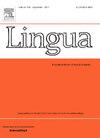Implicit and explicit linguistic biases: The influence of social dominance orientation (SDO) upon hierarchical language attitudes
IF 1.3
3区 文学
0 LANGUAGE & LINGUISTICS
引用次数: 0
Abstract
Research indicates that various social factors can predict language attitudes. However, although social dominance orientation (SDO), the individual’s preference for societal hierarchies, has been found to determine evaluations of a range of social groups and socially meaningful topics, its role in predicting more deeply embedded implicit attitudes in conjunction with more deliberative explicit attitudes towards specific language varieties and their speakers is currently unknown. The present research examined the effect of SDO upon English nationals’ (N = 306) explicit and implicit evaluations of phonological variants indexical of (i) Northern English speech and (ii) Southern English speech in England on competence (Study 1) and warmth (Study 2) dimensions. Regression analysis, controlling for demographic variables, demonstrated that high-SDO predicted negative explicit competence and warmth attitudes towards Northern English speech. Conversely, SDO did not determine self-report Southern English speech evaluations. Likewise, SDO did not predict implicit competence or warmth attitudes. The study findings are discussed in relation to the methodological and theoretical value for (socio)linguists of incorporating SDO measures into research investigating language attitudes at different levels of evaluational awareness.
内隐和外显语言偏见:社会支配倾向对等级语言态度的影响
研究表明,各种社会因素可以预测语言态度。然而,尽管社会支配取向(SDO),即个体对社会等级的偏好,已经被发现决定了对一系列社会群体和社会意义话题的评价,但它在预测更深入嵌入的内隐态度以及对特定语言种类及其说话者更审慎的外显态度方面的作用目前尚不清楚。本研究考察了SDO对英语国民(N = 306)对英国北部英语和南部英语语音变体指数在能力(研究1)和温暖(研究2)维度上的外显和内隐评价的影响。在控制人口统计学变量的情况下,回归分析表明,高sdo对北方英语言语的外显能力和热情态度有负向的预测作用。相反,SDO不决定自我报告的南方英语语音评价。同样,SDO也不能预测内隐能力或热情态度。研究结果讨论了(社会)语言学家将SDO测量方法纳入不同评价意识水平的语言态度研究的方法论和理论价值。
本文章由计算机程序翻译,如有差异,请以英文原文为准。
求助全文
约1分钟内获得全文
求助全文
来源期刊

Lingua
Multiple-
CiteScore
2.50
自引率
9.10%
发文量
93
审稿时长
24 weeks
期刊介绍:
Lingua publishes papers of any length, if justified, as well as review articles surveying developments in the various fields of linguistics, and occasional discussions. A considerable number of pages in each issue are devoted to critical book reviews. Lingua also publishes Lingua Franca articles consisting of provocative exchanges expressing strong opinions on central topics in linguistics; The Decade In articles which are educational articles offering the nonspecialist linguist an overview of a given area of study; and Taking up the Gauntlet special issues composed of a set number of papers examining one set of data and exploring whose theory offers the most insight with a minimal set of assumptions and a maximum of arguments.
 求助内容:
求助内容: 应助结果提醒方式:
应助结果提醒方式:


